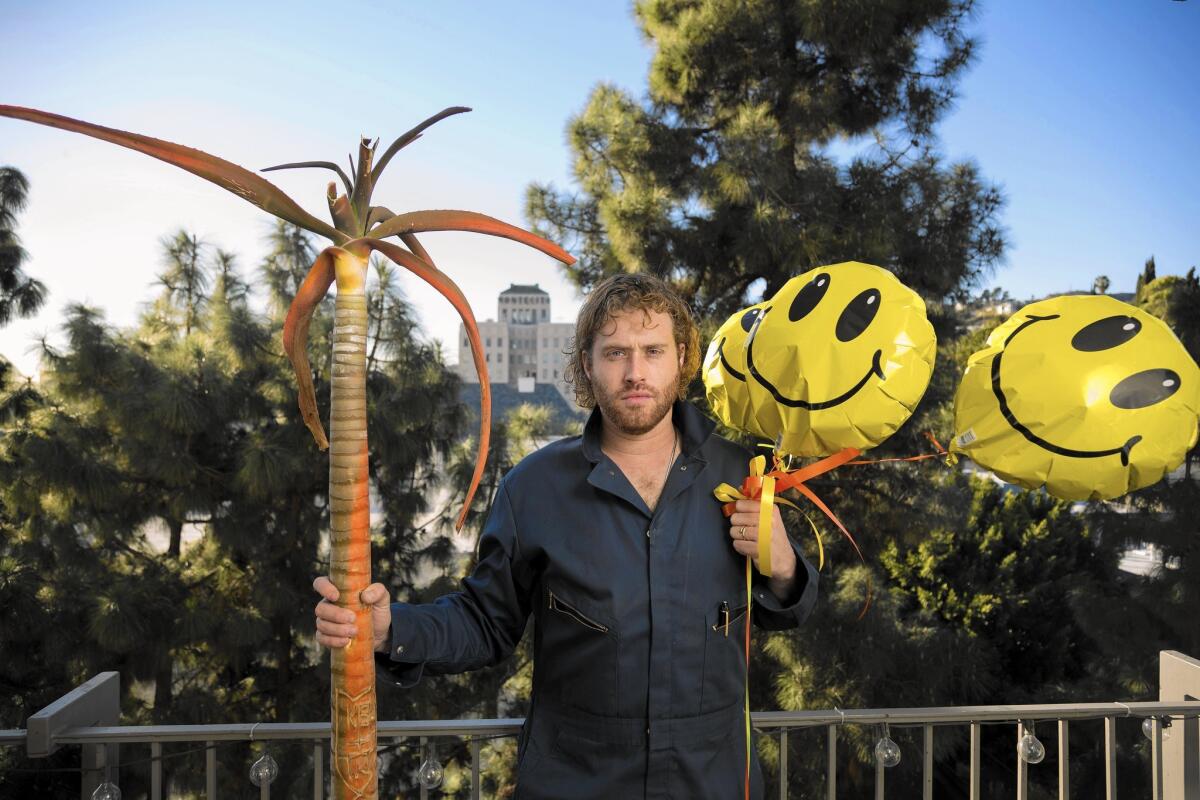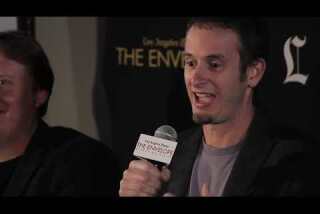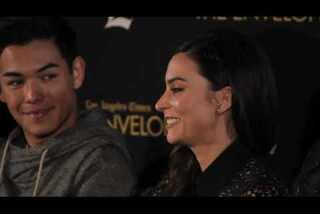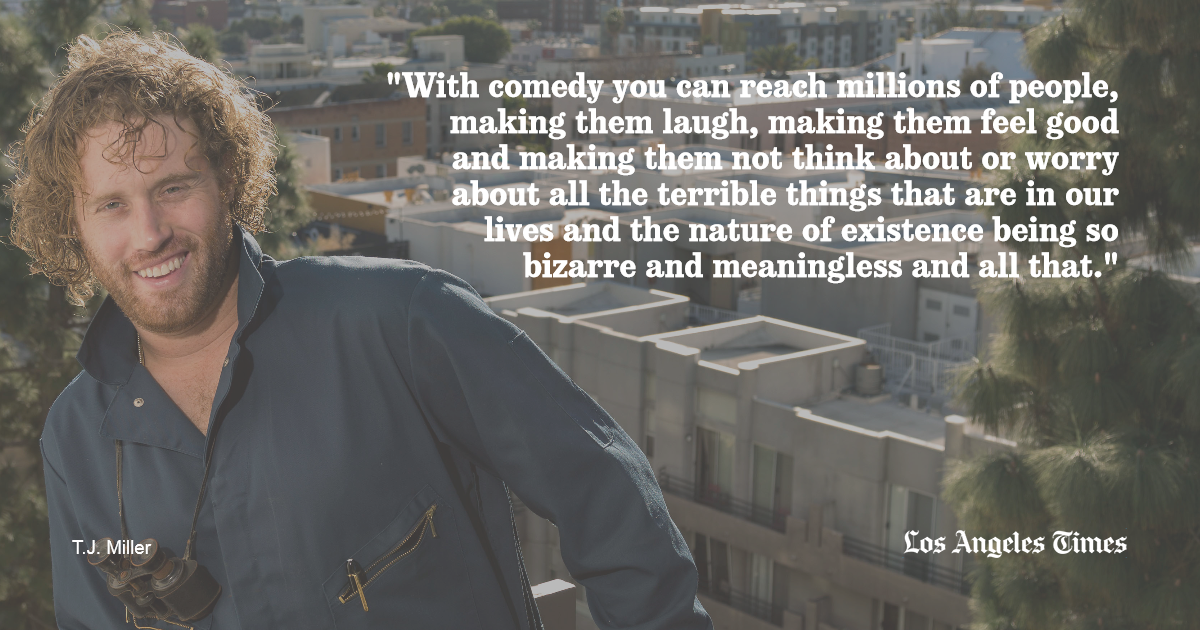Q&A: Critics Choice Awards host T.J. Miller sees comedy as ‘a great way to contribute to mankind’

- Share via
A year ago, T.J. Miller won supporting comedy actor at the Critics Choice Awards, edging big names including Adam Driver of “Girls” and Tony Hale of “Veep.” Miller will be back at the Critics Choice Awards on Sunday night — this time as host.
Miller, 34, may not be a household name, but his rising status in showbiz was on display at the American Film Institute’s Lifetime Achievement Award dinner for Steve Martin last year, when Amy Poehler gave a shout-out from the stage to “T.J.” in the audience. Twice.
Credit Miller’s breakout role as the blowhard Erlich Bachman on HBO’s “Silicon Valley,” the owner of a tech incubator — his suburban tract house — that serves as headquarters for a fledgling startup.
SIGN UP for the free Classic Hollywood newsletter >>
When the show isn’t shooting, Miller tours on the standup comedy circuit. His voice-acting work has been featured in animated films including Disney’s “Big Hero 6” and DreamWorks Animation’s “How to Train Your Dragon” films. An HBO comedy special is on tap.
You’ve got the Critics Choice Awards on Sunday night: How much of the material for the show are you writing yourself?
You kind of need as much help as you can get. As you saw, Ricky Gervais got slaughtered after the [Golden] Globes. My show is going to be completely different than that. It’s not going to be about, “Who’s T.J. going to cut into next? Who is he going to make feel uncomfortable?”’ There is a schadenfreude in that that I don’t particularly enjoy.
Envelope Screening Series: ‘Big Hero 6’


Video: 'Big Hero 6': Casting a Japanese American to play Hiro

Video: 'Big Hero 6:' How characters convey action with voice

Video: 'Big Hero 6': Actors can't wait for 'Toy Story 4'
The joke of Hollywood is that it’s filled with scum and hollowness and emptiness, and you guys are all whining brats. To me, it’s more interesting to look at how important culture, and how important art, is in people’s lives right now. That stems from me as a comedian thinking comedy is really important. Life is hard. Not great. Kind of tragic. So what I want to do is keep momentum going and remind people that this is fun. Even the losers should really have a good time tonight. Have a good time, enjoy the drink, and celebrate some of the better stories.
Have you been studying awards show emcees, and if so, who do you find most influential?
I’m a student of comedy in general, so I’ve always loved Billy Crystal. But I’m a different type of showman. I’m a clown and a jester. To be honest, the most helpful thing was watching Ricky do his thing at the Globes. It reminds you what a small part of this overarching ceremony you are but also that you’re the master of ceremonies. So you really set the tone.
I also have to be a little different from other awards show hosts — a little more absurdist. People hired me to host a gig, so you have to deliver with respect to keeping the show moving — getting big, hard laughs at certain points, and ideally not being uncomfortable or mean. I am going to work my … off to make it hysterical at every turn. But also with some sentimental value. For some of these people, this validates them to their parents, to the world. They took a risk and it worked out, something that so rarely happens.
How has “Silicon Valley” changed your life? Can you show up at a Starbucks in Palo Alto and not be mobbed?
I think people seem to be responding to the show in a way where they not only recognize me but they want to talk about it. I have people come to me and say, “I’m you in the show — at our company.” Or they say, “I work at a tech company, and [the show] is too close to real life.” And that gives me a platform to take a look at our self-inflated corporate culture in the United States. It gives me an opportunity to be a part of this incredible satire [“Silicon Valley” creator] Mike Judge made, one of the greatest satirists of our time.
The show plays off a lot of stereotypes in Silicon Valley: the geeky engineers, the venture capitalists, the villainous tycoons. But are there actually guys like Erlich in Silicon Valley?
Yes, to be sure. You know there are guys just getting started, they’re being brash and brazen. They’re like producers in Hollywood. Some of them are buffoons. Hollywood is the only thing more ridiculous than Silicon Valley. There’s nowhere else where it’s stranger. The attention that’s given to certain people.
But it’s the first time I’ve been on a television show that people really responded to.
When did you realize you were funny, and when did you decide to make a career as a comic?
In college [George Washington University], I was in this improv group called Recess. We went around when I first got in the group — I was the only one who got in that year —- and I said, “So are you guys are all theater majors?” And they said, “No.” And I said “How would you ever make your living off of being funny?” And they said, “There are lots of ways. You can write, you can write for TV shows, you can do stand-up for a living.” And that made me go, “Oh, comedy could be a profession.”
When I was in high school, I was doing all the plays. My drama teacher, Melody Duggan, was the one one who first made me do stand-up. She’s the origin of the whole thing, it’s all her. In high school in Denver, that was kind of the beginning of it all.
As you were trying to make it as a stand-up, did you ever think of quitting?

T.J. Miller quote
I didn’t. I’m one of the really lucky guys who figured out a way to make [it]. I had kind of a philosophy, a mission statement, behind it. I didn’t want to be a politician because I don’t think they get that much done, in terms of changing people’s lives. And then I was like, I could be a psychologist but you can only help a few hundred, maybe a few thousand. But with comedy you can reach millions of people, making them laugh, making them feel good and making them not think about or worry about all the terrible things that are in our lives and the nature of existence being so bizarre and meaningless and all that. If I could add some absurdity, that would be a great way to contribute to mankind. I could reach millions of people, if only for an hour or an hour and a half. I think ephemeral escapism is a pretty good drug. So essentially I sell alcohol at comedy clubs, and I sell a drug called comedy on television. So because of that I never thought of quitting. I thought, “This is the path.”
Tell us about your parents.
My father is a personal injury attorney. He wrote this book on tort law in Colorado. He worked on the side of huge insurance companies for years, where he learned how they often [deny] people their insurance settlements that they deserve, and then he switched over to the plaintiffs’ side. And my mother is an ER psychologist, so that’s a pretty intense job, where you are evaluating people’s minds and behavior.
I understand you proposed to your wife [Kate Gorney] under the Levitated Mass rock at the Los Angeles County Museum of Art. True?
Kate is an artist. She’s the cultured one. In trying to impress her, to make her think that I was actually cultured, I took her there. LACMA is this great museum that is the centerpiece of Los Angeles’ very rich museum culture. I had an opportunity to do a pun, and hopefully make her giggle during the proposal, and feel the weight of this moment in this place that she loves and adores, [by saying] “We’ve come between a rock and a hard place.”
More to Read
The complete guide to home viewing
Get Screen Gab for everything about the TV shows and streaming movies everyone’s talking about.
You may occasionally receive promotional content from the Los Angeles Times.







